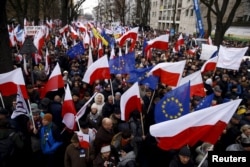Tens of thousands marched through Warsaw on Saturday to protest against what they called the "democratorship" of the month-old conservative government, as Poland remained locked in a constitutional crisis.
Waving Polish and European Union flags, the protesters chanted: "We want the constitution, not a revolution," demanding that the government respect the rule of law.
The constitutional clash began when the eurosceptic Law and Justice (PiS) party, which scored a landmark election win in October, appointed five out of 15 judges to the highest judicial body, in a move the opposition described as illegal.
PiS denies the charge, saying it was the former government of the center-right Civic Platform (PO) that broke the law.
PO passed a bill this year allowing the previous parliament to appoint five judges instead of the three it had been scheduled to elect in the 15-seat tribunal. But President Andrzej Duda, a close ally of PiS, failed to swear them in, opening the way for PiS to challenge their candidacies.
PiS scrapped the nominations, and its parliamentary majority elected five new judges, who were sworn in by Duda. A lengthy fight could hurt Poland's image as a model of post-communist transition.
Gaining control of the court is key for the party. It may determine whether PiS is able to implement its flagship policy plans, such as overhauling the retirement system and curbing foreign ownership of banks, moves the court could block.
"The current constitutional court is a stronghold of everything that's wrong with Poland," PiS leader Jaroslaw Kaczynski told private broadcaster Republika. "All of our moves can be undermined [by it] in an arbitrary way."
Critics say the government is emulating Hungary's Prime Minister Viktor Orban in trying to impose its political agenda by pushing the boundaries of democracy.
An opinion poll conducted for public television found that just over half of Poles said they thought democracy was under threat.
'Danger' to democracy
The Saturday march was attended by nonpartisan organisations and opposition parties.
"Today, it's an assault on the constitutional court. Tomorrow, it could be an assault on our freedom," said Ryszard Petru, a former World Bank economist who now leads the pro-market Modern party, Poland's fourth parliamentary force.
A Warsaw city official said up to 50,000 people took part. The protesters included economist Leszek Balcerowicz, who designed Poland's shock therapy transition from communism.
"This is Warsaw, not Budapest!," chanted the protesters. Smaller demonstrations took place in other cities.
Asked why she travelled over 100 kilometers (60 miles) to join the protest, retiree Grazyna Huzerowska said: "Because I remember the old times."
"In my family there were people, like my husband, who were in prison for fighting against communism. I see it's starting all over. ... I think the Polish democracy is really in danger."






